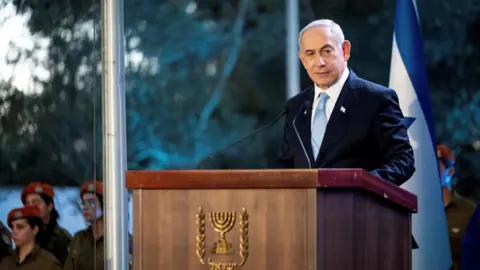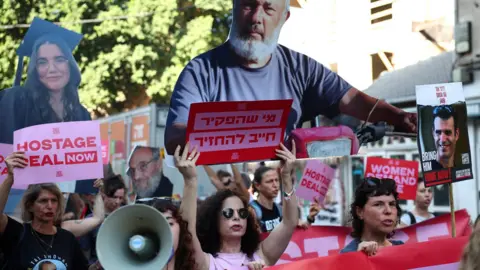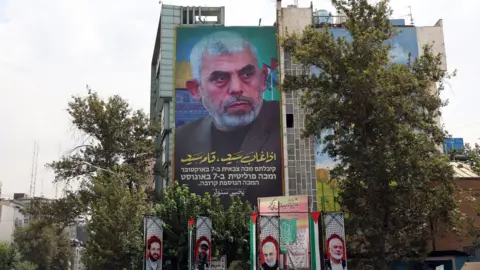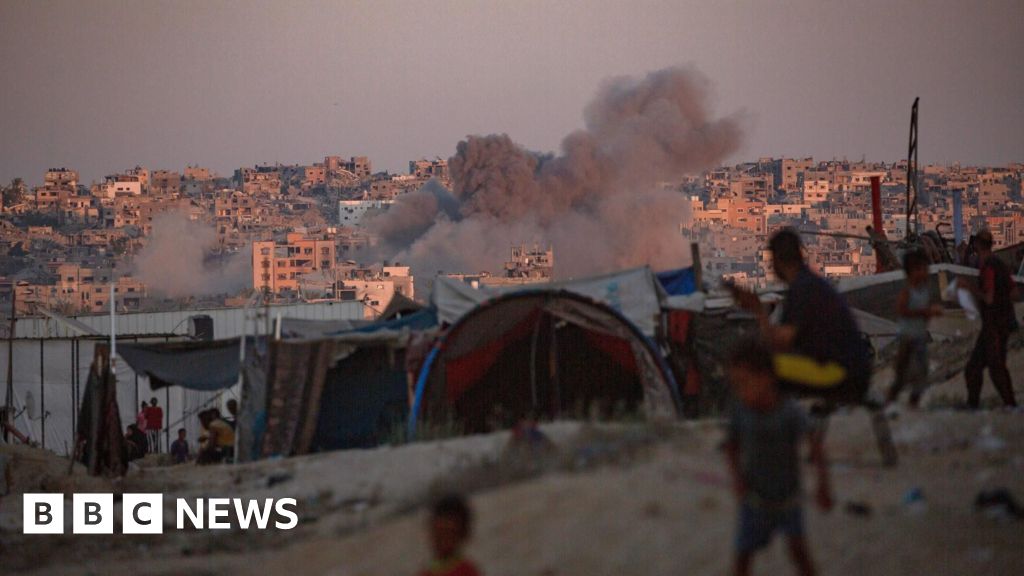 Reuters
ReutersEven the Israeli defense minister has urged Prime Minister Benjamin Netanyahu to reach a deal and agree to a ceasefire in Gaza, if leaks in local newspapers are true.
The stakes and pressure have only grown since Israeli negotiators last traveled to the Qatari capital for talks.
In Israel, relatives of the hostages still being held in Gaza say this is the “last chance” to bring some of them alive.
In Gaza, the Hamas-run health ministry, whose figures have been used by the United Nations and Israel in the past, said the number of people killed in Israeli operations in Gaza since the war began now exceeds 40,000.
The United States is sending a second aircraft carrier and a missile-equipped submarine to the region after Iran and its Lebanese ally Hezbollah threatened to attack Israel in response to last month’s assassinations of key Hamas and Hezbollah leaders.
There’s no lack of motivation to get a deal done.
And there’s no shortage of stress either. The United States believes that the ceasefire in Gaza will help stabilize the entire region.
 Reuters
ReutersThe deal will also help create the conditions for a deal in the growing cross-border conflict between Israel and Hezbollah, U.S. envoy Amos Hochstein said during a visit to Lebanon on Wednesday.
“We must use this window to pursue diplomatic action and diplomatic solutions,” he said. “That time is now.”
His boss, President Joe Biden, appears to be managing expectations. “Things are getting harder and harder,” he told reporters in New Orleans this week, adding, “I’m not going to give up.”
With so much to gain, why are the prospects for these negotiations so slim?
First, a red herring: Hamas’ announcement that it will not send a delegation to the conference is unlikely to have a significant impact.
Negotiations have been indirect, shuttle diplomacy – Hamas representatives do not speak directly to Israel or the United States. The group’s main international base is Doha, where negotiations are ongoing and Qatari and Egyptian negotiators have open lines of communication with them.
 Reuters
ReutersFormer Israeli hostage negotiator Gershan Baskin said the real problem was a lack of motivation among Israeli and Hamas leaders.
“The United States, Egypt and Qatar have decided that they need to change the rules of the game: present an ultimatum, make transitional proposals and tell Hamas and Israel that they must do this,” he said.
“[But] Obviously, the mediator wants to reach an agreement more than the parties do, and that’s a big part of the problem.
Chen Avigdori’s wife and 12-year-old daughter were among 251 people kidnapped by Hamas in an attack on Israel on Oct. 7, in which 1,200 others were killed. The two were released in November and he is currently working to rescue the remaining 111 hostages.
“I think they’re holding on,” he said. “I don’t think Sinwar really cares about his own people. But I think Mr. Netanyahu missed some opportunities that Israel would have had to sign the deal.
 U.S. Environmental Protection Agency
U.S. Environmental Protection AgencyYahya Sinwar was one of the architects of the October 7 attack, and Ismail Haniyeh became the political leader of Hamas after his assassination in Tehran. , the calculation results may change.
“I think Sinwar wants to save himself and save Hamas because they haven’t been completely destroyed, but militarily they have been defeated and may stage a war,” said Chuck Frelich of the Israel Institute for National Security Studies. It turned into a rout.
“Netanyahu is in a more difficult position because if there is a deal, he is very likely to lose his coalition.”
Benjamin Netanyahu has so far held to certain red lines, including giving Israel the right to restart the war if subsequent talks to withdraw troops and exchange prisoners of war fail.
Mr Netanyahu’s far-right allies, for example, have vowed to quit the government if he agrees to release large numbers of Palestinian prisoners from Israeli prisons in exchange for hostages.
 Reuters
ReutersThe sticking points for negotiators are huge. But proposals to bridge some of these problems have been widely reported in Israeli media.
Mr Netanyahu’s insistence, for example, that Israeli troops must remain on Gaza’s border with Egypt to stop armed groups smuggling weapons has been countered by solutions involving technology and the involvement of allies on the ground.
Hamas accused Israel of making new demands and said the time for negotiations was over. It said it was ready to implement the terms agreed last month. Israel denies it is adding new conditions and says they are intended to clarify an agreement that has already been reached.
The deal’s international mediators – the United States, Qatar and Egypt – certainly have some leverage with both sides, but that may not be enough to force a deal if the parties themselves don’t want it.
“The United States and Qatar can push, they can cajole, they can provide inducements, they can help develop technical solutions,” Chuck Freilich said. “But ultimately, it depends on the specific leaders.”
Ultimately, the fate of these negotiations, Gaza, the hostages – and even the fate of the region itself – will depend on the calculations of two savvy survivors; two warring men.


